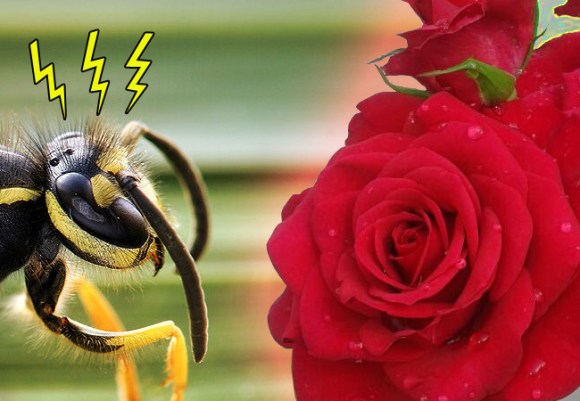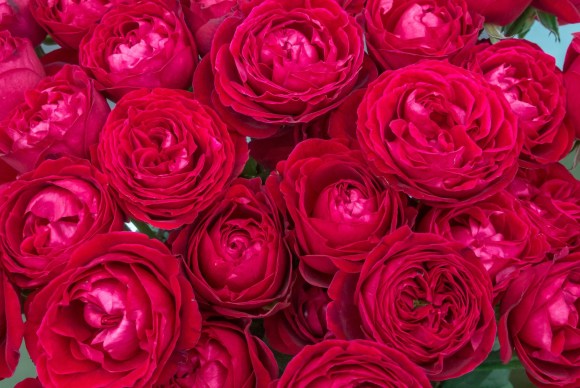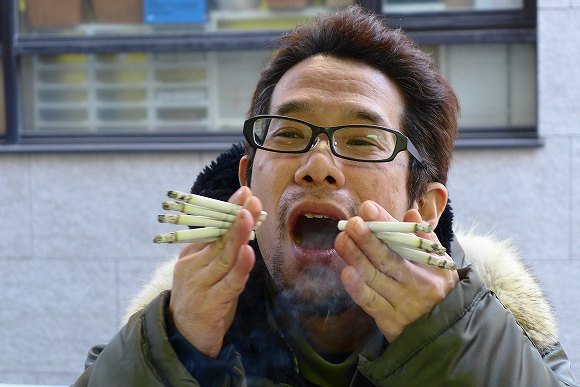
Turns out those vicious insects are just a bunch of big ol’ softies.
In the insect kingdom there aren’t many who match wasps in terms of pure viciousness and aggression. Unlike pretty butterflies who improve the overall ambiance of nature, or the humble dung beetle whose hard-working nature enriches our soil, wasps’ primary service to the world is killing.
As a result of this career, they also tend to get all up in our faces when bothered, resulting in some painful and even occasionally deadly encounters.
But who could have known that to soothe the savage beasts you’d simply need to employ a tactic used by neglectful husbands since the 1920s: a bouquet of pretty flowers!

According to research from a Kochi University team led by Professor Kim Chul-sa, the scent of flowers such as roses and cherry blossoms contain phenethyl alcohol (2-phenylethanol) that repels wasps. So, shoving a bunch of these flowers towards an aggressive yellowjacket may effectively soothe the savage beast. That’s a big “may,” however.
A more effective way would be to spritz some concentrated phenethyl alcohol mist at an ornery hornet to make it lose its will to sting. As an added effect, the compound is also said to stop the wasp from emitting a pheromone that calls for back-up from its equally pissed-off friends.
The discovery was made based on a previous finding by Professor Ichikawa Toshihide of Kagawa University that wasps seemed to either love or hate eating the sap of individual sawtooth oak trees. Prof. Kim’s research uncovered that this phenomenon had to do with the levels of phenethyl alcohol in the sap.
Because of its pleasant aroma, phenethyl alcohol is widely used as a perfume for soaps and foods. It’s even used in cigarettes, but it’s doubtful whether these quantities are enough to have any influence on wasps or not. So, don’t go blowing smoke into a wasp’s face while shouting, “Now what sucka?!”
▼ For what it’s worth, Mr. Sato hasn’t been stung by a wasp recently. He hasn’t been asked out on a date either, though.

Rather, this information is hoped to go towards developing highly effective wasp repellents. We’ll know better how effective they can be when Prof. Kim’s group announces their results at the Japanese Society of Applied Entomology & Zoology Conference in Kagoshima on 26 March.
If we’re really lucky, it can work on a variety of the insects right up to the dreaded giant Asian hornet. But even if not, a future where humans and wasps can coexist just a little more peacefully is a bright one indeed.
Source: Yomiuri Online
Top image: Wikipedia/Richard Bartz, Munich aka Makro Freak, Wikipedia/Alicrescent123 (Edited by SoraNews24)

 Japanese wasp-filled crackers: Their sting is far worse than a bite
Japanese wasp-filled crackers: Their sting is far worse than a bite A visit to Japan’s wasp nest art museum stings us with respect for the industrious insects【Pics】
A visit to Japan’s wasp nest art museum stings us with respect for the industrious insects【Pics】 Honey with Hornets from Japan is exactly what it sounds like【Photos】
Honey with Hornets from Japan is exactly what it sounds like【Photos】 Miyazaki’s new animated short Boro the Caterpillar completed, voice actor revealed
Miyazaki’s new animated short Boro the Caterpillar completed, voice actor revealed Akihabara Radio Kaikan’s gacha capsule toy lucky bag is an otaku delight【Photos】
Akihabara Radio Kaikan’s gacha capsule toy lucky bag is an otaku delight【Photos】 How to order snacks on a Shinkansen bullet train in Japan
How to order snacks on a Shinkansen bullet train in Japan Japan’s new difficult-to-drink-from beer glass protects your liver, but it’s a brutal experience
Japan’s new difficult-to-drink-from beer glass protects your liver, but it’s a brutal experience Burger King Japan suddenly adds Dr. Pepper and Dr. Pepper floats to its menu nationwide
Burger King Japan suddenly adds Dr. Pepper and Dr. Pepper floats to its menu nationwide Demon Slayer: Kimetsu no Yaiba gets new roller coaster attractions and food at Universal Studios Japan
Demon Slayer: Kimetsu no Yaiba gets new roller coaster attractions and food at Universal Studios Japan Hello, cosmetics! Clinique teams up with Hello Kitty this summer for first-time collaboration
Hello, cosmetics! Clinique teams up with Hello Kitty this summer for first-time collaboration Kyoto Tower mascot termination reveals dark side behind cute Japanese characters
Kyoto Tower mascot termination reveals dark side behind cute Japanese characters Nintendo history you can feel – Super NES, N64, and GameCube controllers become capsule toys
Nintendo history you can feel – Super NES, N64, and GameCube controllers become capsule toys This Nara workshop has been making deer crackers for more than 100 years and offers tours【Photos】
This Nara workshop has been making deer crackers for more than 100 years and offers tours【Photos】 High-fashion Totoro cuddle purse is like an elegant stroll in the forest【Photos】
High-fashion Totoro cuddle purse is like an elegant stroll in the forest【Photos】 Legendary Melon Bread by Tokyo Banana returns after 20-year absence【Taste Test】
Legendary Melon Bread by Tokyo Banana returns after 20-year absence【Taste Test】 “The most Delicious Cup Noodle in history” – Japan’s French Cup Noodle wins our heart【Taste test】
“The most Delicious Cup Noodle in history” – Japan’s French Cup Noodle wins our heart【Taste test】 Starbucks releases a cute Frappuccino and Unicorn Cake…but not in Japan
Starbucks releases a cute Frappuccino and Unicorn Cake…but not in Japan McDonald’s Japan’s Soft Twist Tower: A phantom ice cream only sold at select branches
McDonald’s Japan’s Soft Twist Tower: A phantom ice cream only sold at select branches Yabai Ramen: What makes this Japanese ramen so dangerous?
Yabai Ramen: What makes this Japanese ramen so dangerous? Finally! Nintendo Japan expands Switch 8-bit controller sales to everybody, Online member or not
Finally! Nintendo Japan expands Switch 8-bit controller sales to everybody, Online member or not Japanese government wants to build luxury resorts in all national parks for foreign tourists
Japanese government wants to build luxury resorts in all national parks for foreign tourists To combat declining birth rate, Japan to begin offering “Breeding Visas” to foreigners
To combat declining birth rate, Japan to begin offering “Breeding Visas” to foreigners 10 things you should buy at 7-Eleven in Japan
10 things you should buy at 7-Eleven in Japan Studio Ghibli releases anime heroine cosplay dresses that are super comfy to wear
Studio Ghibli releases anime heroine cosplay dresses that are super comfy to wear Woman charged for driving suitcase without a license in Osaka
Woman charged for driving suitcase without a license in Osaka Studio Ghibli unveils My Neighbour Totoro miniature house model
Studio Ghibli unveils My Neighbour Totoro miniature house model Kyoto experiencing problems with foreign tourists not paying for bus fares, but not on purpose
Kyoto experiencing problems with foreign tourists not paying for bus fares, but not on purpose Fighting mild hunger with a Japanese soda that turns into jelly in the stomach【Taste test】
Fighting mild hunger with a Japanese soda that turns into jelly in the stomach【Taste test】 Studio Ghibli’s Howl’s Moving Castle tapestry unveiled in Japan for first time
Studio Ghibli’s Howl’s Moving Castle tapestry unveiled in Japan for first time McDonald’s new Happy Meals offer up cute and practical Sanrio lifestyle goods
McDonald’s new Happy Meals offer up cute and practical Sanrio lifestyle goods Sales of Japan’s most convenient train ticket/shopping payment cards suspended indefinitely
Sales of Japan’s most convenient train ticket/shopping payment cards suspended indefinitely Sold-out Studio Ghibli desktop humidifiers are back so Totoro can help you through the dry season
Sold-out Studio Ghibli desktop humidifiers are back so Totoro can help you through the dry season Japanese government to make first change to romanization spelling rules since the 1950s
Japanese government to make first change to romanization spelling rules since the 1950s Foreigner’s request for help in Tokyo makes us sad for the state of society
Foreigner’s request for help in Tokyo makes us sad for the state of society Ghibli founders Toshio Suzuki and Hayao Miyazaki contribute to Japanese whisky Totoro label design
Ghibli founders Toshio Suzuki and Hayao Miyazaki contribute to Japanese whisky Totoro label design Doraemon found buried at sea as scene from 1993 anime becomes real life【Photos】
Doraemon found buried at sea as scene from 1993 anime becomes real life【Photos】 Tokyo’s most famous Starbucks is closed
Tokyo’s most famous Starbucks is closed Princesses, fruits, and blacksmiths: Study reveals the 30 most unusual family names in Japan
Princesses, fruits, and blacksmiths: Study reveals the 30 most unusual family names in Japan Wasp and mealworm sushi on the (unusual) menu at the Tokyo Bug-Eating Festival 【Photos】
Wasp and mealworm sushi on the (unusual) menu at the Tokyo Bug-Eating Festival 【Photos】 Matcha green tea cricket protein bars appear in Japan, and we’ve eaten them【Taste test】
Matcha green tea cricket protein bars appear in Japan, and we’ve eaten them【Taste test】 Bug hunt! Some areas offering rewards for alien beetles threatening Japan’s cherry blossoms
Bug hunt! Some areas offering rewards for alien beetles threatening Japan’s cherry blossoms Osaka doctor wins Ig Nobel Prize for discovering kisses can reduce allergic reactions
Osaka doctor wins Ig Nobel Prize for discovering kisses can reduce allergic reactions Japan gifts the world with First Essence Tagame Gin made from a giant water bug
Japan gifts the world with First Essence Tagame Gin made from a giant water bug Saitama officially forbids walking up and down escalators
Saitama officially forbids walking up and down escalators First new Japanese cockroach species in 35 years discovered by scientists【Photos】
First new Japanese cockroach species in 35 years discovered by scientists【Photos】 Sakura report 2019: First cherry blossoms begin to bloom in Tokyo
Sakura report 2019: First cherry blossoms begin to bloom in Tokyo New canned sakura liquor beverage appears in Japan, courtesy of Suntory 【Taste test】
New canned sakura liquor beverage appears in Japan, courtesy of Suntory 【Taste test】 Summer in Japan doesn’t feel like a Japanese summer this year, many are saying
Summer in Japan doesn’t feel like a Japanese summer this year, many are saying Japanese marathoners attacked by swarm of hornets, 115 stung
Japanese marathoners attacked by swarm of hornets, 115 stung We visit “Rice and Circus,” a restaurant that combines bugs and Japanese-style cooking【Photos】
We visit “Rice and Circus,” a restaurant that combines bugs and Japanese-style cooking【Photos】 Starbucks Japan reveals second sakura Frappuccino for cherry blossom season 2020
Starbucks Japan reveals second sakura Frappuccino for cherry blossom season 2020 Cosplay mosquito repellent? Japan’s new magical-armor-style accessory protects you from bugs
Cosplay mosquito repellent? Japan’s new magical-armor-style accessory protects you from bugs Lego’s new Botanical Collection opens up a world of permanent petal play for stressed adults
Lego’s new Botanical Collection opens up a world of permanent petal play for stressed adults They have teeth in their stomaches! And 6 other fun facts about cockroaches
They have teeth in their stomaches! And 6 other fun facts about cockroaches
Leave a Reply